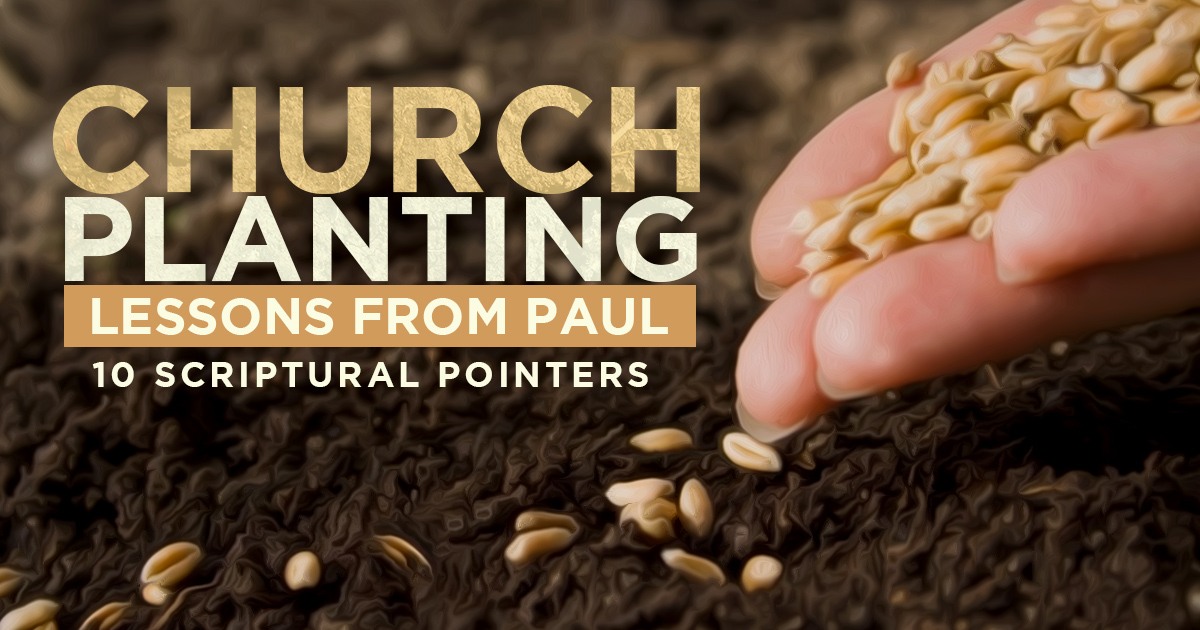
Jesus gave us the command to, “Go and make disciples of all nations…” Since Matthew 28:19, the church continues to push outward. It’s not easy. We know that this going resulted in the martyrdom of all the disciples, except John. We know it also resulted in the beheading of the Apostle Paul and so many others through the ages and even now in modern times, as documented by organizations like The Voice of the Martyrs.
The vision for making disciples is always realized in founding churches. Can we decipher Paul’s way of church planting in Acts? Would its application even be effective today? The answer, I believe, is a resounding yes to both. First, though God will always work through the strengths and weaknesses of a particular person, we can see a pattern in Paul’s work and we can apply it to how God might also use us. Second, we know we’re very much living in Corinth (or something worse). We carry the same Gospel and human beings carry the same hole in their heart that needs filling. With this in mind, here are 10 Scriptural pointers to church planting (or planning), whether you are currently engaged in the work or considering it.
Church Planting Lessons from Paul: 10 Scriptural Pointers
Invest in leadership (Acts 11:19-30; 13:1-3)
Paul never went it alone. His companions included Barnabas, John Mark, Luke and Timothy. He was continually encouraging, praying for, and instructing the leaders at the many church plants he helped develop. He knew he couldn’t do it alone. Take, for example, Antioch, the place where this rag-tag group of Jesus lovers were first called Christians. We see people investing in Paul and Barnabas – fasting and praying over them. We have a few names that we’re likely not as familiar with: Agabus (11:28), Simeon called Niger, Lucius of Cyrene, Manaen (13:1), and we can assume many others. Investment in leadership is a humble endeavor because we’re taking time to realize we’re not the center of the work.
Demand accountability (Act 9:20-31; 12:25; 15)
Paul was no renegade. His Damascus blinding made him both dependent and humble. Before Paul journeyed out, he sought the approval, prayers, support and partnership of Peter and the other apostles. He humbled himself to their leadership, and not only once. He continued in relationship and accountability to the wider work God was doing in and through Peter, James and the others in Jerusalem. We see it in his Jerusalem visits in Acts 9, 12, and 15, times that included mission reports and discipling.
Uncover the needs of your particular community (Acts 14:8-20)
What are the struggles–both physical and spiritual–in the community God is calling us to minister? In Acts 14, Paul and Barnabas journeyed to Lystra. Paul healed a lame man and, by ministering to a physical need, a spiritual problem arose. (This frequently occurs.) The crowd shouted, “The gods have come down to us in human form!” (vs. 11). They were so hungry for something supernatural, they awarded the level of deity to Paul and Barnabas. It didn’t phase the two of them. They used the exaggerated welcome to preach the Gospel which unraveled new problems. (That’s right. Expect the attentiveness to community needs to step on other toes. Be surprised if it does not.) In Paul’s case, toes were stomped on, and the Jewish leaders reacted by quieting his preaching with stones, dragging him to the city gate and leaving him for dead.
Find your Mars Hill (Acts 17:16-34)
We know the story. Have we applied it? Instead of blending into culture with activities that compete for people’s attention, let us find our Mars Hills and speak of the resurrection and the life as it might relate to the audience we find. What a defining moment if we can report, “When they heard about the resurrection of the dead, some of them sneered, but others said, ‘We want to hear you again on this subject'” (vs. 32).
Partner, don’t compete (Acts 16:4-5)
Throughout Acts, the momentum is not toward competition among churches, but rather faithfulness: “As they traveled from town to town, they delivered the decisions reached by the apostles and elders in Jerusalem for the people to obey. So the churches were strengthened in the faith and grew daily in numbers” (vs. 4-5). We may be inclined to dispense this unity, applying it to Paul’s fledgling time of “start-up”, where loyalty and “brand” severely mattered. Is the church of today governed by a duty to capitalism, or the constant guiding principles of the Gospel’s “one as we are one” prayer of Jesus (John 17)? Paul’s work seems to weigh in with Jesus. (I do want to make a brief note on today’s struggle being doctrinal differences with long historical shadows, and, in many cases, social acceptances of late that are clearly out of step and wrong according to Scripture. Offering a remnant alternative is not the competition addressed here.)
Consider tent-making (Acts 18:1-3)
For all we know, Paul continued his work as a tent-maker. On several occasions he mentioned not wanting to be a burden, including in 1 Thessalonians where he says, “Surely you remember, brothers and sisters, our toil and hardship; we worked night and day in order not to be a burden to anyone while we preached the gospel of God to you” (2:9). When we are at work for the Gospel, it is easy to fall into the fundraising mode because that’s often the model for both church planting and missionary work, but Paul provided a more practical, albeit difficult, model that didn’t put him into financial debt to anyone. You wonder why. Perhaps it involves the obvious mixed motives that come when support is granted and Truth is preached.
Keep down the overhead (Acts 20:34-35)
This is in line with the point above. Toward the end of his ministry, Paul said, “I have not coveted anyone’s silver or gold or clothing. You yourselves know that these hands of mine have supplied my own needs and the needs of my companions. In everything I did, I showed you that by this kind of hard work we must help the weak, remembering the words the Lord Jesus himself said: ‘It is more blessed to give than to receive.'” Make sure to focus on the essentials and expect it to be, in agrarian terms, a hard row to hoe. There’s nothing easy about church planting, especially when it comes to finances.
Empower volunteers (Acts 18)
Church planting might begin as our defining work. We spend countless hours investing in it because the needs are great and the workers are few. However, as soon as we can disentangle ourselves from every detail and encourage volunteers to support the effort, the more time we can spend in prayer, fasting, preparation, edification, and healing. We see this measured out in Acts 18, where Priscilla, Aquila and Apollos are in Corinth and are each emboldened by Paul to carry on the work (and I Cor. 1:12;16:19 mention them again). A current example of this is Redeemer Anglican in Richmond, Va. Look at how Dan Marotta set up the staff page. It’s all about equipping the body of Christ (also known as volunteers).
Make Scripture central (Acts 13:13-51; 17:10-15)
There are a number of references to point to, but I like the Bereans, who, “received the message with great eagerness and examined the Scriptures every day.” Why examine the Scriptures? Because Paul was in the business of exegeting. Acts 13 is an example of what Paul did several times – threading the promise and Truth of Jesus all the way through the account of Egypt (in this case) to Isaiah’s prophecy which now fell on his lips, “I have made you a light for the Gentiles, that you may bring salvation to the ends of the earth” (vs. 47). Don’t be intimidated to invade history and science and literature with the Gospel. The stories of God’s providence are strung throughout. And exegete Scripture. Through the preaching of the Scriptures, the Holy Spirit uses us to convict people of their sin and their deepest need for relationship with the Creator.
Don’t preach too long (Acts 20:7-12)
In Paul’s enthusiasm, he “talked on and on” while Eutychus sank more and more quickly into a deep sleep (vs. 9). In our earnest efforts, let’s not lose sight of our audience’s needs and how best to challenge them to go “further up and further in,” as Lewis wrote, to find a lasting sustenance in the Gospel. It doesn’t hurt to also trust that, like Paul, we are equipped for greater miracles lest someone fall from a balcony (John 14:12).
Paul’s ministry demonstrates a need for unceasing prayer and frequent fasting in the work of the Gospel, which is a relentless endeavor. It can exhaust us, so we need to remember what is said in 2 Corinthians 12:9-10: “My grace is sufficient for you, for my power is made perfect in weakness.” Therefore I will boast all the more gladly about my weaknesses, so that Christ’s power may rest on me. That is why, for Christ’s sake, I delight in weaknesses, in insults, in hardships, in persecutions, in difficulties. For when I am weak, then I am strong.”
I guess it’s also important to mention what we don’t see in Paul’s work. We don’t see the Apostles possessing an incessant need to have everything polished and buttoned down, or, might we say, enough parking, an attractive entrance with ample post-modern mingle space, a hip coffee shop area, microphones, laser shows, and all the bells and whistles we think we need. We are keen on window dressing. Paul was always keen on to whom we are being conformed into: “Do not conform to the pattern of this world, but be transformed by the renewing of your mind. Then you will be able to test and approve what God’s will is—his good, pleasing and perfect will” (Romans 12:2). In our church planting and planning, let’s not lose sight of our role: just hands and feet taken in by grace and doing the holy work of a Father who holds it all in his good providence.
 Zach Kincaid is a part of the Sharefaith Editorial Team. He manages workoutyourfaith.com and has written on C.S. Lewis, G.K Chesterton, and general Christian thought for more than 15 years. He is a husband, father, and collaborator on a variety of Christian outreach projects including films and educational resources.
Zach Kincaid is a part of the Sharefaith Editorial Team. He manages workoutyourfaith.com and has written on C.S. Lewis, G.K Chesterton, and general Christian thought for more than 15 years. He is a husband, father, and collaborator on a variety of Christian outreach projects including films and educational resources.
The post Church Planting Lessons from Paul: 10 Scriptural Pointers appeared first on churchrelevance.com.
No comments:
Post a Comment